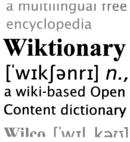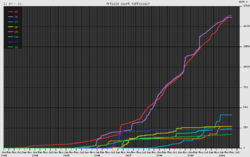विक्शनरी:विक्शनरी:परिचय
- For links to Wiktionary, see the External Links section at the bottom of this page.
Wiktionary (a portmanteau of wiki and dictionary) is a multilingual, Web-based project to create a free content dictionary, available in over 150 languages. Unlike standard dictionaries, it is written collaboratively by volunteers using wiki software, allowing articles to be changed by almost anyone with access to the Web site. Like its sister project Wikipedia, Wiktionary is run by the Wikimedia Foundation. Because Wiktionary is not limited by print space considerations, most of Wiktionary's language editions provide definitions and translations of words from many languages, and some editions offer additional information typically found in thesauruses and lexicons.
Mission
[संपादन]- Explain the meanings of words, multi-word terms, idiomatic phrases, and abbreviations.
- Act as a thesaurus by showing synonyms and related terms.
- Explain etymologies of words.
- Translate words from one language to another.
Additionally, the English Wiktionary now includes Wikisaurus, a category that serves as a thesaurus, including lists of slang words.[१]
History and development
[संपादन]
Wiktionary was brought online on December 12, 2002 following a proposal by Daniel Alston. On March 29, 2004 the first non-English Wiktionaries were initiated in French and Polish. Wiktionaries in numerous other languages have since been started. Wiktionary was hosted on a temporary URL (wiktionary.wikipedia.org) until May 1, 2004 when it switched to the current full URL.[२] As of November 2006, Wiktionary features over 1.5 million entries across its 171 language editions. The largest of the language editions is the English Wiktionary, with over 300,000 entries. It was surpassed in early 2006 by the French Wiktionary, only to regain the top position in September 2006. Eight Wiktionary language editions now contain over 100,000 entries.
Despite Wiktionary's large number of entries, most of the entries and many of the definitions at the project's largest language editions were created by bots that found creative ways to generate entries or (rarely) automatically imported thousands of entries from previously-published dictionaries. Seven of the 18 bots registered at the English Wiktionary[३] created 163,000 of the entries there.[४] Only 259 entries remain (each containing many definitions) on Wiktionary from the original import by Websterbot from public domain sources; the majority of those imports have been split out to thousands of proper entries manually. Another one of these bots, "ThirdPersBot," was responsible for the addition of a number of third-person conjugations that would not receive their own entries in standard dictionaries; for instance, it defined "smoulders" as the "third-person singular simple present form of smoulder." Excluding these 163,000 entries, the English Wiktionary would have about 137,000 entries, including terms unique to languages other than English, making it smaller than most monolingual print dictionaries. The Oxford English Dictionary, for instance, has 615,000 headwords, while Merriam-Webster's Third New International Dictionary of the English Language, Unabridged has 475,000 entries (with many additional embedded headwords). It should be noted, though, that more detailed statistics now exist to more clearly distinguish genuine entries from minor (small) entries.

The English Wiktionary, however, does not rely on bots to the extent that somewhat smaller editions do. The French and Vietnamese Wiktionaries, for example, imported large sections of the Free Vietnamese Dictionary Project (FVDP), which provides free content bilingual dictionaries to and from Vietnamese.[५] These imported entries make up virtually all of the Vietnamese edition's offering. Like the English edition, the French Wiktionary has imported the approximately 20,000 entries in the Unihan database of Chinese, Japanese, and Korean characters. The French Wiktionary grew rapidly in 2006 thanks in large part to bots copying many entries from old, freely-licensed dictionaries, such as the eighth edition of the Dictionnaire de l'Académie française (1935, around 35,000 words), and using bots to add words from other Wiktionary editions with French translations. The Russian edition grew by nearly 80,000 entries as "LXbot" added boilerplate entries (with headings, but without definitions) for words in English and German.[६]
Critical reception
[संपादन]Critical reception of Wiktionary has been mixed. Jill Lepore wrote in the article "Noah’s Ark" for The New Yorker, (November 6, 2006)[७]
There’s no show of hands at Wiktionary. There’s not even an editorial staff. "Be your own lexicographer!" might be Wiktionary’s motto. Who needs experts? Why pay good money for a dictionary written by lexicographers when we can cobble one together ourselves?
Wiktionary isn’t so much republican or democratic as Maoist. And it’s only as good as the copyright-expired books from which it pilfers.
If you look up the word "Webster" in the Wiktionary, you will be redirected to this handy tip:
Noah Webster’s New International Dictionary of the English Language, 1911 (published by Merriam-Webster, Springfield, MA) is a public domain dictionary, as is a 1913 edition, that can be used to empower Wiktionary with more definitions.
Pfui. But, hey, at least they got his first name right.
Keir Graff’s review for Booklist was more neutral:
Is there a place for Wiktionary? Undoubtedly. The industry and enthusiasm of its many creators are proof that there’s a market. And it’s wonderful to have another strong source to use when searching the odd terms that pop up in today’s fast-changing world and the online environment. But as with so many Web sources (including this column), it’s best used by sophisticated users in conjunction with more reputable sources.
References in other publications are fleeting and part of larger discussions of Wikipedia, not progressing beyond a definition, although David Brooks in The Telegraph described it as wild and woolly.[८] (Wooly is defined as "confused" and "unrestrained.") One of the impediments to independent coverage of Wiktionary is the continuing confusion that it is merely an extension of Wikipedia.[९] In 2005, PC Magazine rated Wiktionary as one of the Internet's "Top 101 Web Sites,"[१०] although little information was given about the site.
Wiktionary statistics
[संपादन]| No. | Language | Language (local) | Wiki | Entries | Total | Edits | Admins | Users | Images | Updated |
|---|---|---|---|---|---|---|---|---|---|---|
| 1 | English | English | en | 357384 | 482392 | 2207971 | 48 | 35701 | 124 | 2007-04-23 12:11:11 |
| 2 | French | Français | fr | 316786 | 349355 | 2107179 | 15 | 3551 | 11 | 2007-04-23 12:11:11 |
| 3 | Vietnamese | Tiếng Việt | vi | 209122 | 214206 | 488148 | 3 | 793 | 12 | 2007-04-23 12:11:39 |
| 4 | Turkish | Türkçe | tr | 140003 | 148784 | 230948 | 6 | 1452 | 77 | 2007-04-23 12:11:34 |
| 5 | Chinese | 中文 | zh | 112976 | 130370 | 451000 | 6 | 2293 | 92 | 2007-04-23 12:11:15 |
| 6 | Russian | Русский | ru | 112882 | 130390 | 366698 | 2 | 677 | 131 | 2007-04-23 12:11:28 |
| 7 | Ido | Ido | io | 111684 | 150069 | 457672 | 1 | 99 | 3 | 2007-04-23 12:11:14 |
| 8 | Greek | Ελληνικά | el | 109886 | 121090 | 310879 | 5 | 285 | 19 | 2007-04-23 12:11:24 |
| 9 | Polish | Polski | pl | 70151 | 111135 | 417724 | 13 | 1488 | 112 | 2007-04-23 12:11:12 |
| 10 | Finnish | Suomi | fi | 55521 | 96585 | 307907 | 8 | 1158 | 19 | 2007-04-23 12:11:18 |
Comparison to sister projects
[संपादन]One difference between Wiktionary and Wikipedia is that pages beginning with upper- and lowercase letters can refer to different things. For example, the entries on lowercase "i" and uppercase "I" are distinct. All of the existing entries in the English Wiktionary were converted to lowercase automatically in mid-2005; manual intervention was used to move pages to uppercase (or split entries) as necessary. Links from Wikipedia to Wiktionary must be made with care, as it may be relevant to link to a lowercase entry, link to an uppercase entry, link to an entry with diacritics or link to multiple entries.
Competition
[संपादन]Unlike Wikipedia, Wiktionary has many competitors who offer more comprehensive works online, free of charge.
"Dictionary" vs. "Encyclopedia"
[संपादन]It is a misconception that a dictionary necessarily consists of short definitions. The full text of the OED entry for the verb go weighs close to 300 kilobytes, including a detailed discussion of the term's etymology as well as a careful historical analysis of its many applications. The distinction between encyclopedias and dictionaries is further blurred by the existence of many encyclopedic dictionaries, reference works with a mixture of shorter dictionary entries and longer, more in-depth entries. In some reference works, such as the Enciclopedia Universal Larousse, larger articles are also organized as long dictionary entries. On the other hand, a large work with mostly in-depth prose treatises may be called a "dictionary": the 29-volume Grove Dictionary of Music and Musicians, for instance, contains relatively few dictionary-length entries.
The voting Wiktionary community is evenly divided over whether to allow such detailed essays,[१२] and in-depth entries risk being reverted back to a bare-bones structure. Because of this, in-depth discussions of word histories are often removed,[१३] reflecting the inherent uncertainty in delineating a dictionary from an encyclopedia.
References
[संपादन]- ↑ See "Creating a Wikisaurus entry" for information on the structure of Wikisaurus entries. An example of a well-formatted entry would be "Wikisaurus:insane".
- ↑ Wiktionary's current URL is www.wiktionary.org.
- ↑ The user list at the English Wiktionary identifies accounts that have been given "bot status".
- ↑ TheDaveBot, TheCheatBot, Websterbot, PastBot, NanshuBot
- ↑ Hồ Ngọc Đức, Free Vietnamese Dictionary Project. Details at the Vietnamese Wiktionary.
- ↑ LXbot
- ↑ The full article is not available on-line. साचा:cite news
- ↑ David Brooks, "Online, interactive encyclopedia not just for geeks anymore, because everyone seems to need it now, more than ever!" The Telegraph (August 4, 2004)
- ↑ In this citation, the author refers to Wiktionary as part of the Wikipedia site: साचा:cite news
- ↑ साचा:cite web
- ↑ List of Wiktionary editions, ranked by article count.
- ↑ vote on "whether to allow people to create in-depth word histories for words", March 2007
- ↑ entries such as Witch (etymology), Man (word), Arab (etymology); see Category:Etymologies
External links
[संपादन]- Wiktionary front page
- Wiktionary's Multilingual Statistics
- Wikimedia's page on Wiktionary (including list of all existing Wiktionaries)
- Pages about Wiktionary in Meta.
- The Wiktionary Widget for the Mac OS X Dashboard which pulls up Wiktionary articles.
